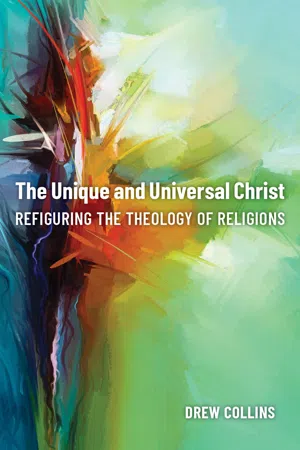
- 254 pages
- English
- ePUB (mobile friendly)
- Available on iOS & Android
About This Book
From the early days of the Christian faith, the relationship between the twin realities of Jesus' historical particularity and universal presence has been a theological puzzle. The apparent dichotomy of the two leads Christ-followers to ponder some difficult questions: Who is Jesus to those who do not know him? Who are those who do not know him to those who do? Do "we" who follow Jesus meet him in "those" who do not?
Contemporary debates concerning Christian theology of religions have been profoundly shaped by Alan Race's threefold typology of exclusivism, inclusivism, and pluralism. Scholars increasingly recognize the insufficiency of this typology, and a consensus about how to replace it remains elusive. With The Unique and Universal Christ, Drew Collins argues that an alternative theological approach to the relation between the uniqueness of Jesus Christ and the universality of God's presence can be gleaned from the theology of Hans Frei and his fivefold typology of Christian theology. With Frei's model as an interpretive lens, Collins examines the various ecumenical movements of the twentieth century and their conversations around theological authority in connection to Christianity's relationship with other faith traditions. A new paradigm emerges for conceptualizing Christian faith amid the rich diversity of our world.
Reconsidered in this light, the Christian theology of religions ceases to be a combative venture that pits a Christian faith committed to the scandalous particularity of Jesus Christ's identity as the Son of God against a faith open to the possibility of encountering the divine presence in the world at large. Instead, it becomes a mode of exploration, hoping for such encounters with the universal presence of Christ because of the uniqueness of Jesus.
Frequently asked questions
Information
Table of contents
- Cover
- Title Page
- Copyright Page
- Dedication
- Contents
- Preface
- Acknowledgments
- 1 Introduction: What Is the Christian Theology of Religions?
- 2 Alan Race’s Threefold Typology
- 3 Hans Frei, Christian Theology, and the Question of Authority
- 4 Frei’s Typology and the Twentieth-Century Ecumenical Movement
- 5 Conclusion: Unique Faith and the Hope of Universal Belonging
- Bibliography
- Index